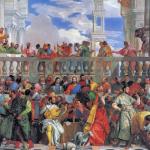Alastair Roberts and Andrew Wilson’s splendid Echoes of Exodus begins with the claim that “Scripture is music” (21). Music functions as a controlling metaphor for Scripture and for reading Scripture.
That means, for starters, that the Bible is written to a pulse of tension and resolution: “Sometimes two or more books of the Bible, or even two or more parts of the same book, seem to clash with each other, and no resolution is obvious. Yet as the biblical piece develops, we find new themes being introduced, which bring the various instruments together, rearrange things somewhat, and resolve with a harmony that does justice to all of them” (24).
It means too that the Bible has both melodic and harmonic features: “The Bible has a clear storyline, a melody, a tune, and it can be summarized (or sung) by a small child.” At the same time, “it has a range of individual and corporate stories that run together, sometimes taking center stage, sometimes fading into the background, providing harmony and counter-point, treble and bass, heigh and depth.” It is “both memorably simple, even catchy, and incredibly intricate at the same time” (24).
Music also provides a guiding metaphor for understanding biblical temporality, its regular-beat meter and its patterned rhythms. You can construct a chronology from Scripture, but “strong, accented, audible beats dominate the rhythm,” beats like “Sabbath, Passover, the Day of Atonement, Pentecost,” which “form regular patterns that draw regular attention to particularly important moments in the story” (25). Each time we hear one of these beats, we’re taken back to the first time we heard it, and propelled forward to the next beat.
So, for instance: “when Mary approaches the tomb early in the morning of the first day of the week, while it is still dark, we are swept back to the first day of the first week, while it is still dark, and we anticipate the Word of God shattering the darkness: ‘Let there be light!'” (25).
That’s only a few pages, and it’s not even everything on those few pages. And every page of this book is like that – packed, pithy, thrilling. You want this book. You need this book.










